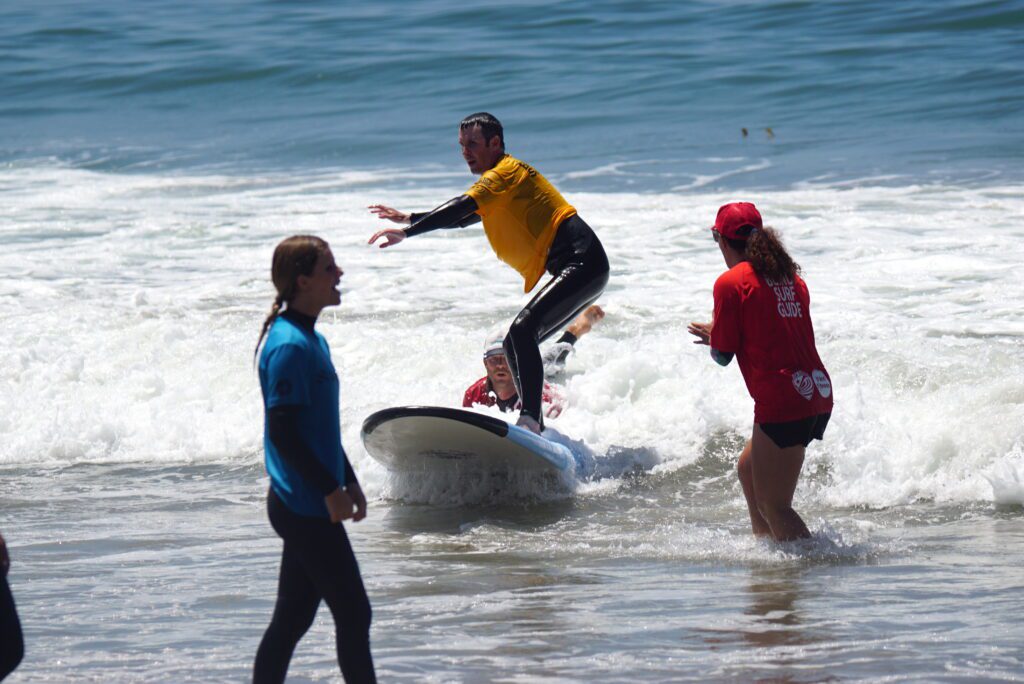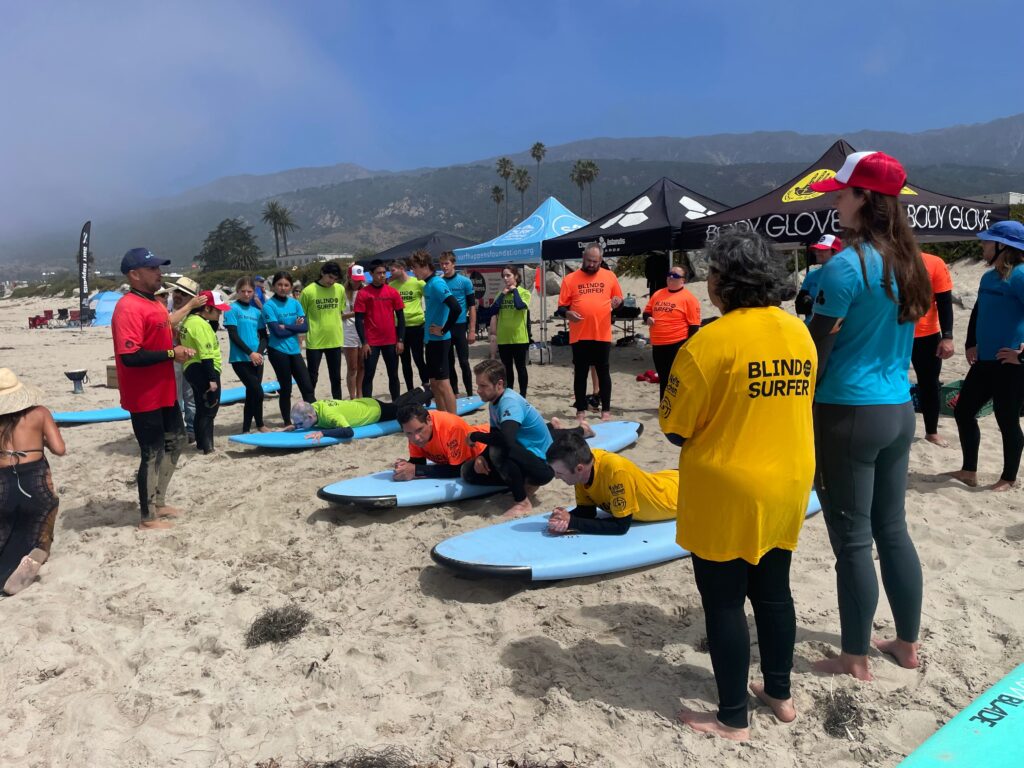Founded after the COVID-19 pandemic, Blind Fitness offers numerous recreational activities, including an annual surf clinic.

When Brianna Pettit established Blind Fitness in Santa Barbara, California following the COVID-19 pandemic, her goal was to provide fitness and recreational programs accessible to the blind and low vision community and reduce the challenge of accessibility.
Pettit, who previously worked as an orientation and mobility instructor, began with simple activities like beach walking and hiking. As time went on, the list has expanded to include bike riding, canoeing, yoga, and surfing. It even offers an O&M program, which Pettit oversees.
In just a few short years, Blind Fitness has reached about 100 participants ranging in age from teens to seniors. Pettit has been pleasantly surprised by the outpouring of support.
“This community has been incredibly welcoming to the blind and visually impaired,” said Pettit, a lifelong California native. “Any event, any sport we’ve wanted to do, we’ve made it happen. I’ve never been turned away.”
After receiving a BA in psychology from the University of California, Berkeley and a master’s in special education from Cal State LA, Pettit worked for the Braille Institute before launching Blind Fitness. A lifelong lover of the outdoors, she coped with the pandemic by hiking, running and going to the beach. It was while volunteering for a Para surf competition that the idea of forming Blind Fitness began to take form in her mind.
“I kind of just dove off the deep end, not knowing how it was all going to work. I started just meeting people, one thing led to the next and I was building a nonprofit. I’ve had incredible support throughout the entire thing.”
Beach walking, gym classes, yoga and O&M are among Blind Fitness’s most popular programs. Instructors are mostly comprised of volunteers, although Pettit has paid several to conduct gym classes. All participate in basic training geared toward teaching the blind and visually impaired, such as when to offer verbal cues or walking as a guide.
An avid surfer, Pettit wanted blind individuals to experience the thrill of being on a surfboard and catching a wave. Inspired by her previous experience with the Para surf event, Pettit held a blind surf clinic in 2023.
Through a partnership with Surf Happens, a local group offering lessons and camps for interested surfers, Pettit had the equipment and instructors needed to conduct the clinic.
“They’re just great. They do it for a living. They have everything on the beach all summer.”
Pettit first became acquainted with Foreseeable Future Foundation CEO Griffin Pinkow through Richard Hunter, a blind athlete and advocate for physical activity. After hearing about the surf clinic, Pinkow agreed to provide funding for a second one in 2024. The money covered equipment, instructor fees and transportation.
The four-hour clinic took place July 27 at Santa Claus Lane Beach just south of Santa Barbara. A total of 15 blind participants donned wet suits and got on a surfboard, many for the first time.

After a short orientation, instructors helped surfers get into their wetsuits. One of the instructors then led a group circle to share his background and a brief history of surfing. Participants were put into groups of five and learned the basics of getting on and off a surfboard and going from a prone paddling position to standing.
Once on the water, instructors helped the surfers paddle out to the deep end one at a time. Those who waited their turn were given a play-by-play description of what was taking place on the water.
“There was a lot of cheering, laughing and play. It was great.”
A local lions club provided and served lunch courtesy of a local restaurant that supports people with disabilities. Some surfers chose to go back out for a second round on the water, while others chose to stay behind.
Having never been on a surfboard before, Daniel Broz had no idea what to expect. The 41-year-old Broz, who is legally blind from a genetic eye condition called choroideremia, joined Blind Fitness shortly after it was established.
Any trepidation he had vanished almost immediately after suiting up and getting on the board.
“It was mind-blowing,” said Broz, who wasn’t able to attend the first clinic in 2023. “Everybody was so nice and welcoming, (but) not in that condescending way some people are. I absolutely fell in love with it. I want to do it again.”
Bob Burnham, who serves on Blind Fitness’s board of directors, was born with glaucoma and wears prosthetics in both eyes. The 73-year-old California native had previous experience body surfing but had never been on a board.
Burnham spent most of the clinic body surfing but decided to try getting on a surfboard.
“One time, I wiped out and flipped off the board,” Burnham said. “But I hung onto it as I rode into shore. I was laughing; I thought it was fun. A wipeout didn’t discourage me or make me feel like I failed. I was having too much fun.”
For Pettit, seeing people like Broz and Burnham eager to try something new is what makes Blind Fitness fulfilling.
“It was so fun to watch people like (Dan and Bob) out there having a blast in an activity I personally find so much joy in.”
